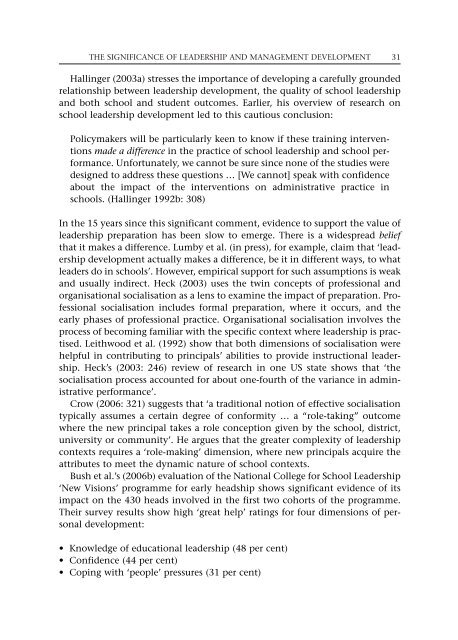Leadership and Management Development in Education (Education ...
Leadership and Management Development in Education (Education ...
Leadership and Management Development in Education (Education ...
Create successful ePaper yourself
Turn your PDF publications into a flip-book with our unique Google optimized e-Paper software.
THE SIGNIFICANCE OF LEADERSHIP AND MANAGEMENT DEVELOPMENT31Hall<strong>in</strong>ger (2003a) stresses the importance of develop<strong>in</strong>g a carefully groundedrelationship between leadership development, the quality of school leadership<strong>and</strong> both school <strong>and</strong> student outcomes. Earlier, his overview of research onschool leadership development led to this cautious conclusion:Policymakers will be particularly keen to know if these tra<strong>in</strong><strong>in</strong>g <strong>in</strong>terventionsmade a difference <strong>in</strong> the practice of school leadership <strong>and</strong> school performance.Unfortunately, we cannot be sure s<strong>in</strong>ce none of the studies weredesigned to address these questions … [We cannot] speak with confidenceabout the impact of the <strong>in</strong>terventions on adm<strong>in</strong>istrative practice <strong>in</strong>schools. (Hall<strong>in</strong>ger 1992b: 308)In the 15 years s<strong>in</strong>ce this significant comment, evidence to support the value ofleadership preparation has been slow to emerge. There is a widespread beliefthat it makes a difference. Lumby et al. (<strong>in</strong> press), for example, claim that ‘leadershipdevelopment actually makes a difference, be it <strong>in</strong> different ways, to whatleaders do <strong>in</strong> schools’. However, empirical support for such assumptions is weak<strong>and</strong> usually <strong>in</strong>direct. Heck (2003) uses the tw<strong>in</strong> concepts of professional <strong>and</strong>organisational socialisation as a lens to exam<strong>in</strong>e the impact of preparation. Professionalsocialisation <strong>in</strong>cludes formal preparation, where it occurs, <strong>and</strong> theearly phases of professional practice. Organisational socialisation <strong>in</strong>volves theprocess of becom<strong>in</strong>g familiar with the specific context where leadership is practised.Leithwood et al. (1992) show that both dimensions of socialisation werehelpful <strong>in</strong> contribut<strong>in</strong>g to pr<strong>in</strong>cipals’ abilities to provide <strong>in</strong>structional leadership.Heck’s (2003: 246) review of research <strong>in</strong> one US state shows that ‘thesocialisation process accounted for about one-fourth of the variance <strong>in</strong> adm<strong>in</strong>istrativeperformance’.Crow (2006: 321) suggests that ‘a traditional notion of effective socialisationtypically assumes a certa<strong>in</strong> degree of conformity … a “role-tak<strong>in</strong>g” outcomewhere the new pr<strong>in</strong>cipal takes a role conception given by the school, district,university or community’. He argues that the greater complexity of leadershipcontexts requires a ‘role-mak<strong>in</strong>g’ dimension, where new pr<strong>in</strong>cipals acquire theattributes to meet the dynamic nature of school contexts.Bush et al.’s (2006b) evaluation of the National College for School <strong>Leadership</strong>‘New Visions’ programme for early headship shows significant evidence of itsimpact on the 430 heads <strong>in</strong>volved <strong>in</strong> the first two cohorts of the programme.Their survey results show high ‘great help’ rat<strong>in</strong>gs for four dimensions of personaldevelopment:• Knowledge of educational leadership (48 per cent)• Confidence (44 per cent)• Cop<strong>in</strong>g with ‘people’ pressures (31 per cent)
















